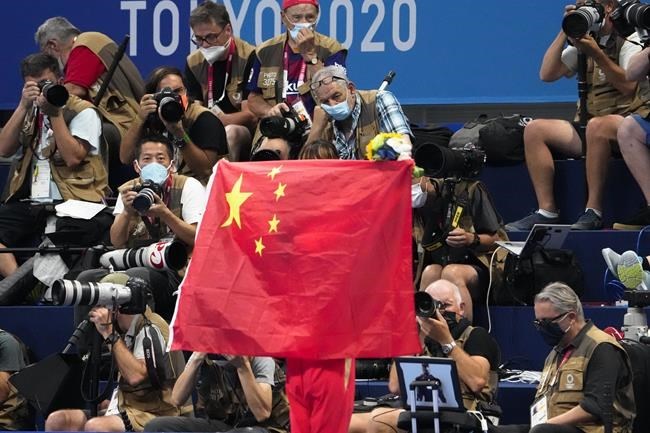MONTREAL (AP) — The world’s top anti-doping regulator said after reviewing a television documentary and newspaper reports that it stands by its decision to clear 23 Chinese swimmers to compete at the 2021 Tokyo Olympics despite testing positive for a banned heart medication.
The World Anti-Doping Agency issued a statement following the release Sunday of a documentary on the cases by German broadcaster ARD.
In an earlier statement following initial newspaper reports, WADA said it agreed with Chinese authorities and ruled that the swimmers’ samples had been contaminated.
The New York Times reported that Chinese anti-doping authorities found the results of the tests were Adverse Analytical Findings, but cleared the swimmers without any penalties after finding that the samples were flagged as positive as a result of contamination.
“Following WADA’s review of the documentary, the agency still stands firmly by the results of its scientific investigation and legal decision concerning the case,” WADA said in the statement Sunday. “We are equally confident that WADA’s independent Intelligence and Investigations Department followed up on all allegations received, which were not corroborated by any evidence; and thus, did not meet WADA threshold to open an investigation.”
WADA said based on available scientific evidence and intelligence, “which was gathered, assessed and tested by experts in the pharmacology of trimetazidine (TMZ); and, by anti-doping experts,” it had no basis under the global anti-doping code to challenge the Chinese agency's findings of environmental contamination.
WADA said the position was also accepted by World Aquatics, which governs international swimming.
Chinese Foreign Ministry spokesperson Wang Wenbin on Monday described the media reports as “disinformation and a misrepresentation”, and affirmed WADA’s decision.
Wang said China’s anti-doping authorities investigated the incident and found the positive results were due to “the ingestion of contaminated food by the relevant athletes without knowledge of the contaminated food, and the Chinese swimmers involved were not at fault or negligent, which did not constitute a doping violation."
“I want to emphasize,” he said, “that the Chinese government has maintained a firm stance of zero tolerance towards doping, strictly abides by the WADA Code, resolutely safeguards the physical and mental health of athletes, maintains fair play in sports competitions, and contributes positively to the global efforts in the crackdown on doping.”
WADA scheduled a news conference for later Monday, saying its president, Witold Banka, and director general Olivier Niggli would be among the officials on hand to answer questions.
The 30-member Chinese swim team won six medals in Tokyo, including three golds. Many of the athletes still compete for China and are expected to swim at the Paris Olympics that start in July.
In its initial statement, WADA responded to what it called “some misleading and potentially defamatory media coverage this week” and explained the process it undertook upon learning about the positive tests.
The global drug-fighting organization said it also had been given a tip by the U.S. Anti-Doping Agency as early as 2020 — before this case arose — about allegations of doping cover-ups in China but that USADA never followed up with evidence.
USADA CEO Travis Tygart called the news of the Chinese positive tests “crushing.”
“It’s even more devastating to learn the World Anti-Doping Agency and the Chinese Anti-Doping Agency secretly, until now, swept these positives under the carpet by failing to fairly and evenly follow the global rules that apply to everyone else in the world,” Tygart said.
The drug at the center of this case was also the medication that led to the suspension of Russian figure skater Kamila Valieva at the Winter Olympics in Beijing in 2022.
In that case, WADA moved quickly to sanction Valieva upon learning about her positive test.
The case underscores what many view as a flaw in the global anti-doping system — that a country's own anti-doping organization is often the first line of defense in catching drug cheats and those organizations have different levels of motivation to fulfil that role.
___
AP sports: https://apnews.com/sports
The Associated Press




